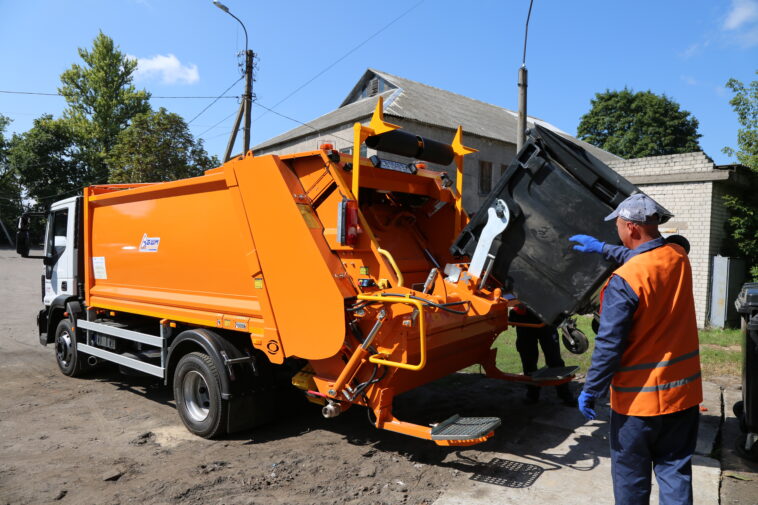Solid waste management is a service that the Snovska community of Chernihiv Oblast has chosen as a priority in the second phase of cooperation with the USAID DOBRE Program. The community recently received a garbage truck that will expand the coverage by the service and improve its quality.
The local authorities analyzed the needs and conducted a public opinion survey to choose the service most needed by the people. Then, they assembled a working group that created a detailed plan for improving the service to ensure that all work would be systemic and aimed at the overall result. The community already has experience in phased service improvement: earlier, Snovsk chose medicine, and together with USAID DOBRE, it renovated and modernized the local hospital. As part of the cooperation, new furniture and equipment were purchased for the hospital. As a result, the hospital managed to expand the number of medical services and become more profitable.
“Solid waste management is the second service we are improving together with USAID DOBRE. We have purchased 48 European containers, which have been installed in places with the highest concentration of people, in particular near high-rise buildings. We plan to buy another 52 containers next year, and we will install them in educational institutions, hospitals, etc.,” said Ms. Natalia Avdiyevska, Secretary of the Snovsk City Council.
Most garbage used to be collected from the street by hand – people left their garbage outside their homes in bags or boxes. A tractor or an old special vehicle would pick them up and take them to the landfill. All of this took a lot of time, and they could not cover the entire community. The old garbage truck is 12 years old, although the warranty period for this equipment is limited to 10 years. Now, the community has containers in the most crowded places. And USAID DOBRE purchased a garbage truck worth UAH 4.5 million for the Snovsk utility company.
Ms. Hanna Koshova, head of the utility company, noted that the new truck is much more powerful than the old one – its capacity is 12 cubic meters instead of 7.8. In addition, it works and travels faster, so they will be able to collect garbage faster.
“The purchase of this vehicle greatly supports the city and villages of the community. The new truck will allow us to quickly collect more garbage. We can still use the old vehicle as an additional one. So, in one working day, we will cover more settlements in the community, and in general, we will expand the service to other localities. We will have an environmentally friendly and less polluted area,” said Ms. Koshova.
The Snovska community aims not only to improve the quality of garbage collection, but also to reduce the amount of hazardous waste. Working with the new modern machine will reduce the time for garbage collection, help cover a larger area, and generally improve the quality of the service. As a result, the community hopes that the number of signed contracts will increase.
“The purchase of a garbage truck is just one of the projects of a comprehensive five-year program that USAID DOBRE helped prepare. In general, the program is very large, and the community has devoted a significant part of its efforts to educating and informing people to reduce the amount of garbage and sort more. Even 10 garbage trucks will not solve the problem of garbage if people do not feel responsible. After all, a person has to sign a contract, pay for the service, and ideally sort the waste. The problem of garbage can only be solved comprehensively,” added Ms. Natalia Safronova, USAID DOBRE Program Specialist.
Ms. Oksana Lychak, Chief Specialist of the Economic Development and Investment Department, said that the service improvement program in the Snovska community is a multi-component one. It includes the installation of composters for recycling organic waste in educational institutions and kindergartens to reduce the amount of solid waste. It also includes systematic educational work to foster the habit of sorting garbage and a responsible attitude to the purity of nature from an early age.
In order to reduce the amount of plastic and bags in general, they plan to sew eco-bags in Snovsk. The community has this opportunity thanks to a joint project with USAID DOBRE – a sewing coworking space that has been launched at the local lyceum as part of the local economic development component. And they will be able to tell about all this thanks to a brand new media laboratory, for which the USAID DOBRE Program purchased equipment for photo and video filming.
In less than 4 years of cooperation, the Snovska community has implemented 13 projects under the USAID DOBRE Program. All of them work and complement each other as the community seeks to create opportunities for a comfortable life.
***
The USAID Program, “Decentralization Offering Better Results and Efficiency” (DOBRE), is a nine-year program, implemented by Global Communities and funded by the United States Agency for International Development. DOBRE has worked closely with 100 consolidated communities (CCs) in ten Oblasts of Ukraine to help them realize the benefits and meet the challenges brought by decentralization. DOBRE provides technical and material assistance to CCs to help them govern openly and accountably and meet the needs of their citizens; and supports citizens’ active engagement in decision-making and policy making. DOBRE’s support encompasses strategic planning; spatial planning; financial management; public service delivery; local economic development; capacity building; good governance practices; and gender- and youth-responsive policies.
In the period 2022 – 2025, DOBRE will be working directly with at least 60 CCs of Ukraine to help them cope with the consequences of the war, recover and rebuild, and resume their trajectory of positive, sustainable development. Partners with Global Communities in the DOBRE Program Consortium include the Ukrainian Crisis Media Center; the Foundation in Support of Local Democracy, and the Malopolska School of Public Administration at the Krakow University of Economics, Poland.

